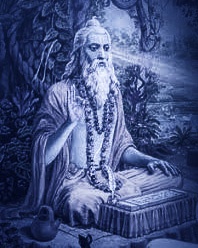Guru Purnima at the full moon

In June or July of each year, students commemorate their spiritual teachers (Gurus) with a big festival in India, but also in many parts of Asia. This festival is always celebrated at a full moon (Purnima):
3rd July 2012 [*]
22nd July 2013
12th July 2014
31st July 2015
In Hinduism, this day is also dedicated to the wise Vyasa who is connected to vital Indian writings, like the Vedas, a significant collection of religious scripts.

The legend says that Vyasa was born on Guru Purnima and began later with the writing of the Brahma Sutra on this full moon day. The festival is therefore also called Vyasa Purnima. Often, these texts are read and symbolic gifts are presented during the celebration.
In Buddhism, Buddha is commemorated, who held his first sermon on this day in Sarnath, Uttar Pradesh.
It is a valuable idea to show gratitude towards your teacher and to cherish their memory. The Western world can surely learn one thing or two from the Eastern world.

[*] If looked at precisely and astronomically, the full moon in India takes place on 4th July 2012, shortly after midnight at 12:21:54 am (IST). But because all festivities are stretched over the course of days, this is not really noticeable.

Guru Purnima is the day when one expresses his gratitude to his Guru.
Osho says that a guru is the one who liberates us and with whom we are in deep love, faith and reverence. A guru is a presence. Through him one gets the first glimpse of divinity. A guru creates, transforms and gives a new birth to a seeker so that with complete trust one can follow his guru while traveling through many unknown paths and doors and opening many unknown locks. Speaking on the significance of a guru, Osho says that a guru’s blessing is a vital phenomenon. Through a guru one can look into his own future and can be aware of his own destiny. Through him one starts coming up like a seed trying to sprout towards the sky.
In Osho’s own words:
“Guru means one who has gravitation, around whom you suddenly feel as if you are being pulled. The guru is a tremendous magnet, with only one’ difference. There is a man who has charisma — you are pulled, but you are pulled towards him. That is the man of charisma. He may become a great leader, a great politician. Adolf Hitler has that charisma; millions of people are pulled towards him. Then what is the difference between a charismatic leader and a guru? The difference is tremendous. The difference is: when you are pulled towards a guru you suddenly feel that you are being pulled inwards, not outwards.
When you are pulled towards Kabir, Nanak, Buddha, you have a strange feeling. The feeling is that you are being pulled towards them and at the same time you are being pulled inwards — a very strange paradoxical phenomenon
at the closer you come to your guru, the closer you come yourself. The more you become attracted towards the guru, the more you become independent. The more you become surrendered to the guru, the more you feel that you have freedom you never had before.
So it is a very subtle difference. Remember it. If you are Pulled towards a man and that pull creates a slavery, that an is not the guru. That man may have charisma, may have magnetic power — maybe his great intelligence, his physical beauty, or his sheer vitality pulls you — but you will be going away from yourself. It will be an infatuation. You will be obsessed with this man, and you will be off your center.”
There is abundant in eastern traditions.
India, Pakistan, China, Japan, Iran and … There is a tradition like this.
They’re all righteous and to respect their leaders, and memorial ceremonies are held.
For example, in Iran:
Zoroaster and the new ordinance
He is the founder of Zoroastrianism or Mzdayy celebration.
The scientists agreed that Zoroaster was born 300 years before Alexander.
I am almost two great thinker Zoroaster Buddha and Confucius is Old World.
The three men believed that they follow the man’s happiness and happiness the Zoroastrian religion knew a bad defeat (victory of good against evil).
It follows the common sense of Confucius and Buddha believed in the philosophy and the need.
Thales, the Greek felicity in both knowledge and having the spirit of scientific curiosity knew.
Birthplace of Zoroaster (probably) was the first Iranian Azerbaijanis lived in western Iran.
His first ad in the same areas as their own thoughts and opinions.
But after a few days and to the East Azarbaijan, Iran did not see fit to promote their religion, and in states east of Bactria began to be promoted.
Vyshtasb dormitory, he supported his state of Bactria.
But Zarathustra Ashrafyan opposed.
Zoroastrianism was the favored rights of free people, especially farmers.
Every person has the task of religion is that God of War (creator Good deeds) and Ahriman (the creator of evil) with good thoughts and good words and good behavior (three slogans of the Zoroastrian religion) go to God and good will prevail.
But apart from the good guys, heavenly creatures are among the six God, then Zarathustra to their common name (Amshaspndan) say.
In the oldest part of Avesta Gathas Gvshvsvrvn (animal spirit) of the oppression that he would be upset.
This is just one of the Iranian customs.
And as I said, all Asian countries (east) with its ancient history with frequency codes are written many books in this field.
Thanks